#Anemone Sylvestris
Explore tagged Tumblr posts
Text


white anemone sylvestris
2024/04/13
#photographers on tumblr#aesthetic#nature#photography#nature photography#naturecore#spring#flowers#flora#Anemone sylvestris#anemone
650 notes
·
View notes
Text
Anemone Sylvestris -- FOTD Sep 06
Hi all 👋 My latest post for Cee’s FOTD. Anemone sylvestris
0 notes
Text

Anemone sylvestris or Snowdrop anemone or Snowdrop windflower. I have used an old german projector lens, a Rodenstock Splendar f2.8 100mm, I have mounted the lens on my modern Sony full-frame camera, It was a bit complicated to build an adapter.
31 notes
·
View notes
Text
Seeds Purchased from Stonecrop Gardens, NY
One of the biggest benefits of membership at Stonecrop is access to their amazing seed bank. Members can purchase rare seeds for $1 a pack. These are plants that are sometimes extremely difficult to find at nurseries and that work perfectly for my area. Here is a list of what I purchased from them...some I've already begun.
The seed collection got suddenly a lot more interesting.
Rarium: Centaurea macrocephala
Rarium: Digitalis parviflora
Rarium: Echinops exaltatus
Rarium: Hosta sieboldiana var. elegans
Rarium: Polygonatum giganteum
Rarium: Salvia coccinea 'Brenthu
Seminum: Acmella oleraceae
Seminum: Actaea japonica (syn. Cimicifuga japonica)
Seminum: Actaea racemosa (syn. Cimicifuga racemosa)
Seminum: Actaea simplex 'Brunette' (syn. Cimicifuga ramosa 'Brunette'
Seminum: Agastache foeniculum 'Alba'
Seminum: Allium angulosum
Seminum: Allium tuberosum
Seminum: Amaranthus hybridus var. erythrostachys
Seminum: Ammi visnaga
Seminum: Anemone virginiana
Seminum: Anethum graveolens
Seminum: Angelica gigas
Seminum: Anthriscus sylvestris 'Raven's Wing'
Seminum: Aster tataricus
Seminum: Astilboides tabularis (syn. Rodgersia tabularis)
Seminum: Astrantia major
Seminum: Calendula officinalis
Seminum: Campanula takesimana 'Alba'
Seminum: Cuphea viscosissima
Seminum: Cynoglossum amabile ‘Firmament’
Seminum: Emilia coccinea
Seminum: Helleborus orientalis
Seminum: Ipomoea lobata (syn. Mina lobata)
Seminum: Monarda punctata
Seminum: Nigella damascena 'Miss Jekyll Blue'
Seminum: Papaver somniferum Mix
Seminum: Salvia farinacea
Seminum: Verbena bonariensis
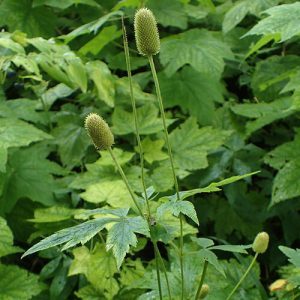
Anemone virginiana. Interesting thing about this plant is that for years I've pulled it thinking it was a weed. On the years that I forgot to pull it, I was like, man that is pretty! So I now leave it alone. It's drought tolerant and the flowers are loved by pollinators. I'll be planting some more from seed as well.

Anethum graveolens - Dill
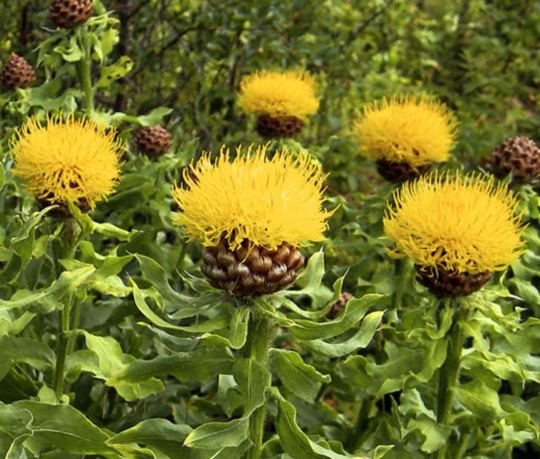
Centaurea macrocephala - Started Seeds 5/3/2024 - This plant is too cool for school!
Category: Rarium | Sub-Category: Perennials for Sun
Scientific Name (Genus/Species): Centaurea macrocephala
Family: (Asteraceae)
(P) to 3′. Great Golden Knapweed. Caucasus. A large, leafy, robust plant bearing sturdy stems topped with incredible, rich golden yellow, hemispherical, thistle-like blooms. The fringed, rusty brown coloured involucre of bracts is very prominent and persists. Midsummer. Makes excellent dried cut flowers. Sun. 3, D & T2

Digitalis parviflora - Started seeds 5/3/2024 - Really different foxglove. Love it.
Category: Rarium | Sub-Category: Perennials for Sun
Scientific Name (Genus/Species): Digitalis parviflora
Family: (Plantaginaceae)
(P) to 2′. Spanish Foxglove. This is a true perennial species of Foxglove, native to the mountains of northern Spain. Plants form a rosette of dark, deeply veined, green leaves bearing in early summer, tightly packed spikes of small, rusty orange-red to chocolate brown flowers on stiff, leafy, upright stems. Eye-catching. Well-drained soil. Sun. 4 & T2
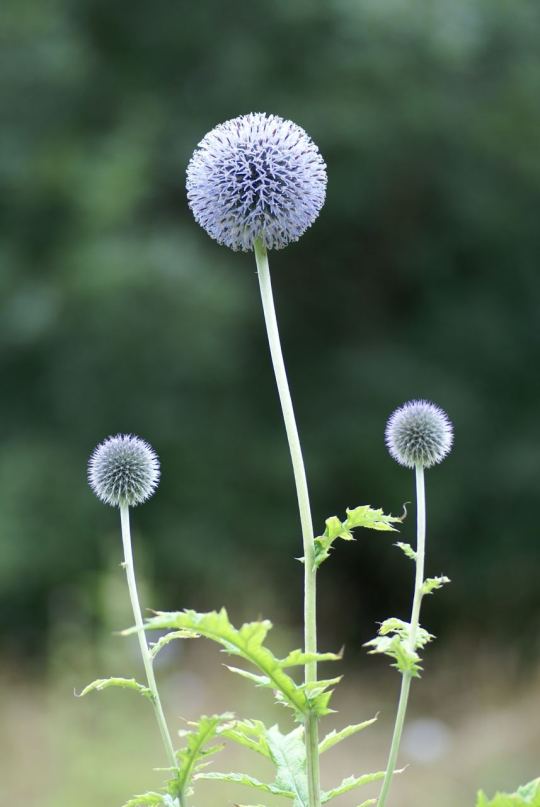
Echinops exaltatus
Category: Rarium | Sub-Category: Perennials for Sun
Scientific Name (Genus/Species): Echinops exaltatus
Family: (Asteraceae)
(P) to 6′. Tall Globe Thistle. Eastern Europe to Russia. Globular flowerheads composed of numerous, tiny, pale blue florets. Flowerheads to 2-½ inches in diameter stand tall on sturdy, downy-white stems and mature into dense, prickly seedheads. The bold, greyish green, thistle-like foliage forms an impressive clump. This summer-to-fall bloomer is a magnet for bees, hoverflies and butterflies. Sun. 4 & T2
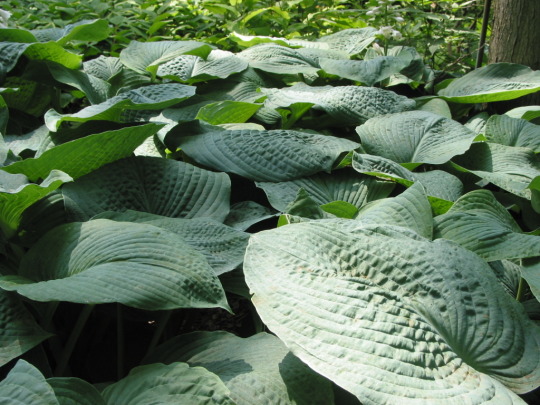
Hosta sieboldiana var. elegans
Category: Rarium | Sub-Category: Woodland
Scientific Name (Genus/Species): Hosta sieboldiana var. elegans
Family: (Asparagaceae)
(P) to 3′. “…most sumptuous of all the Hostas.” (GST**). Huge, broad, glaucous, heavily textured, bluish green leaves form magnificent, stately clumps that add accent and poise to the woodland garden. The pale lilac-white flowers appear in early to midsummer, though they barely emerge from beneath the foliage. 3 & T3, then it may need 40º for 2-3 months.
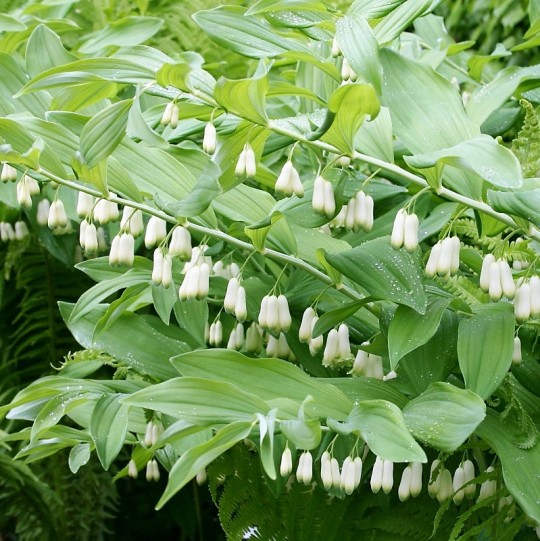
Polygonatum giganteum - Started 5/3/24
Category: Rarium | Sub-Category: Woodland
Scientific Name (Genus/Species): Polygonatum giganteum
Family: (Asparagaceae)
(P) to 7′. Giant Solomon’s Seal. Statuesque and unmistakable. This spectacular giant is similar to Polygonatum biflorum in everything but size. Bell-shaped, greenish white, tubular flowers hang from the tall arching stems in early summer with the dark blue berries following in fall. Moist soil. Shade/partial shade. 3 & 6
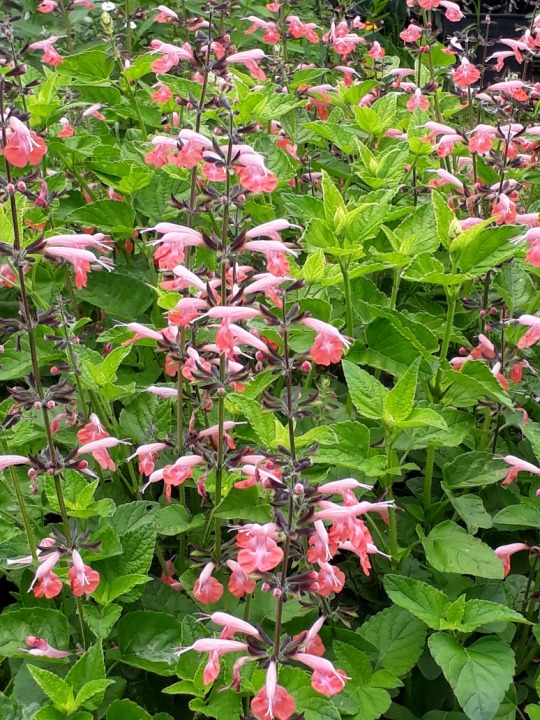
Salvia coccinea 'Brenthurst'
Category: Rarium | Sub-Category: Annuals for Sun
Scientific Name (Genus/Species): Salvia coccinea 'Brenthurst'
Family: Lamiaceae
(A/TP) to 2.5′. A cool-coloured cousin of the red bedding Salvia with numerous spikes of bicoloured, lipped blooms. The pale whitish pink upper hoods and three lobed, deeper pink lower lips contrast nicely against the dark tinted calyces and stems. Blooms late summer and lasts until frost. Sun. 4 & T2
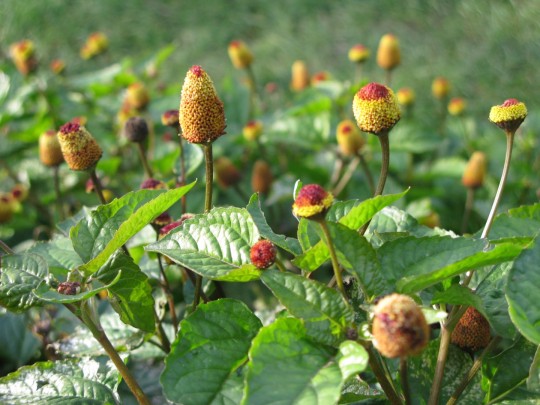
Acmella oleraceae - Toothache Plant
Category: Seminum | Sub-Category: Annuals for Sun
Scientific Name (Genus/Species): Acmella oleraceae
Family: (Asteraceae)
(A) to 10″. Toothache Plant. South America. A profusion of rounded, orange-yellow disc florets with brownish red centres resemble eyeballs. Creeping, bronze-green foliage has numbing properties when chewed, hence the common name. Easy to grow. Very unusual and fun; a “must have”. Summer blooming. Sun. 3 & 6
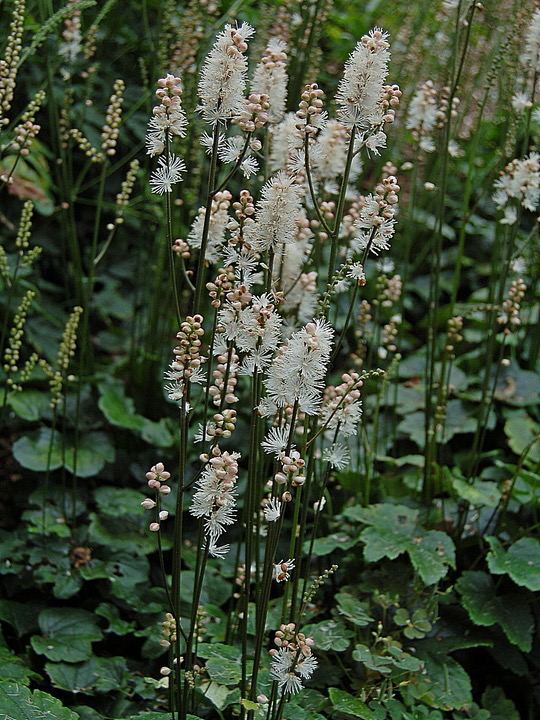
Actaea japonica (syn. Cimicifuga japonica) - snakeroot
Category: Rarium | Sub-Category: Woodland
Scientific Name (Genus/Species): Actaea japonica var. acerina (syn. Cimicifuga japonica var. acerina)
Family: (Ranunculaceae)
(P) to 3′. A Japanese native with handsome maple-like foliage that has long, pointed lobes. Slender branched spikes of white, tufted flowers bloom in September and October. Moist soil. Sun/partial shade. 3 & 6A

Actaea racemosa (syn. Cimicifuga racemosa)
Category: Seminum | Sub-Category: Woodland
Scientific Name (Genus/Species): Actaea racemosa (syn. Cimicifuga racemosa)
Family: (Ranunculaceae)
(P) to 6′. Early Snakeroot, Black Cohosh. An eastern North American native with branched wands of white, bottlebrush flowers. Blooms prolifically in June. Light green, divided foliage remains at three feet tall. Partial shade. 3 & 6A
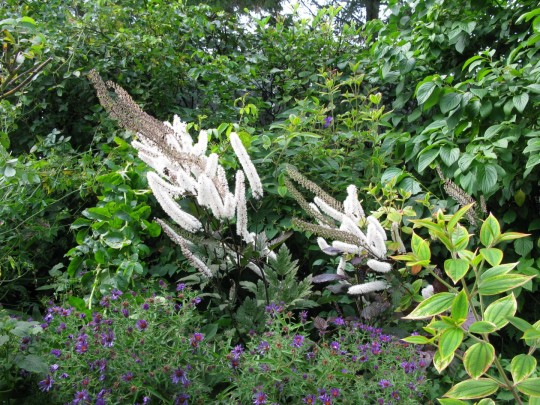
Actaea simplex 'Brunette' (syn. Cimicifuga ramosa 'Brunette')
Category: Seminum | Sub-Category: Woodland
Scientific Name (Genus/Species): Actaea simplex 'Brunette' (syn. Cimicifuga ramosa 'Brunette')
Family: (Ranunculaceae)
(P) to 6′. One of the darkest leaved Cimicifugas. Stems are a rich purplish brown with pure white, upright, fragrant flower spikes in September. Not all seedlings will be as dark as ‘Brunette’, but definitely worth a try. Partial shade. 3 & 6A

Agastache foeniculum 'Alba'
Category: Seminum | Sub-Category: Perennials for Sun
Scientific Name (Genus/Species): Agastache foeniculum 'Alba'
Family: Lamiaceae
Short-lived perennial to 3.5′. White Anise Hyssop. A white cultivar of the above. Sun/partial shade. 4 & T2
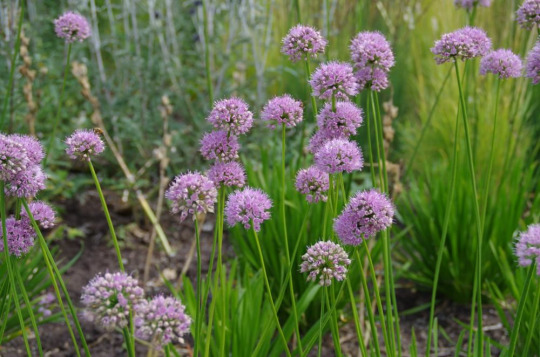
Allium angulosum - mouse garlic
Category: Seminum | Sub-Category: Bulbs
Scientific Name (Genus/Species): Allium angulosum
Family: (Alliaceae)
Hardy bulb to 16″. Mouse Garlic. Europe. Loose heads formed by multiple, cup-shaped flowers of pale purple. Blooms June to August. Sun. 3 & 6
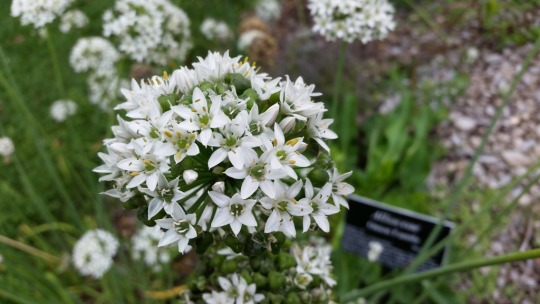
Allium tuberosum - this already grows wild here
Category: Seminum | Sub-Category: Bulbs
Scientific Name (Genus/Species): Allium tuberosum
Family: (Alliaceae)
Hardy bulb to 18″. Garlic Chives. Southeast Asia. Spherical, white blooms freshen the flower garden throughout August. Sun/partial shade. 3 & 6
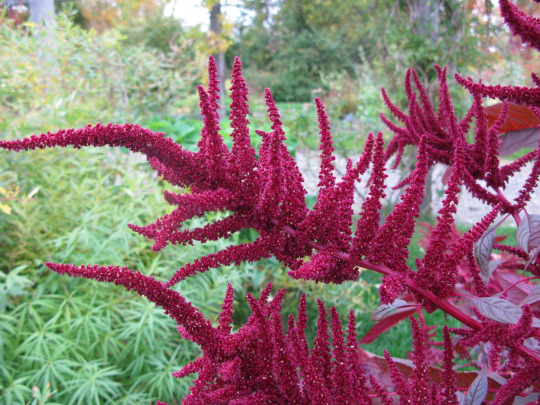
Amaranthus hybridus var. erythrostachys
Category: Seminum | Sub-Category: Annuals for Sun
Scientific Name (Genus/Species): Amaranthus hybridus var. erythrostachys
Family: (Amaranthaceae)
(A) to 5′. Peruvian Tassel Flower. Many branched panicles of crimson, tassel-like flowers accentuated by the deep maroon foliage of this plant, creates drama in the border. Sun. 3 & T3
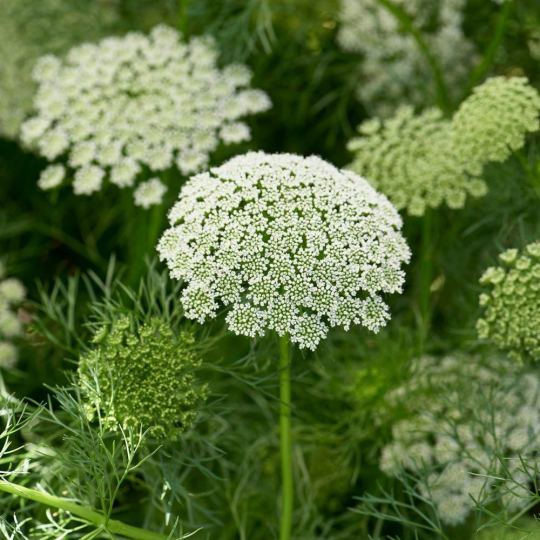
Ammi visnaga - Started Seeds 5/3/2024
Category: Seminum | Sub-Category: Annuals for Sun
Scientific Name (Genus/Species): Ammi visnaga
Family: (Apiaceae)
(A) to 3′. Khella, Toothpick Plant. Egypt. Grown since antiquity for medicinal purposes. This sophisticated Queen Anne’s Lace relative produces masses of feathery, delicate, aromatic foliage topped with wide, compound, flat umbels of tiny, greenish-white flowers. An excellent and unusual filler; most desirable for cut flower displays. Well-drained soil. Sun. 3 & T1
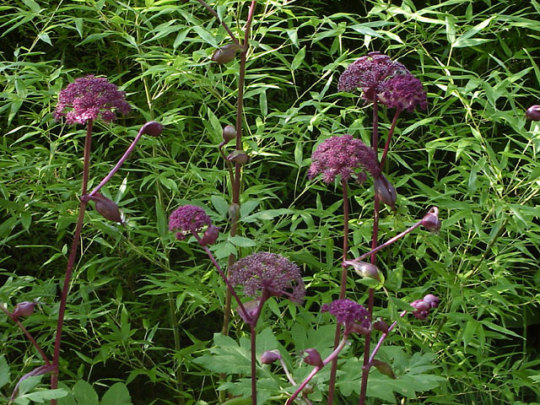
Angelica gigas - Started seeds 5/3/2024
Category: Seminum | Sub-Category: Perennials for Sun
Scientific Name (Genus/Species): Angelica gigas
Family: (Apiaceae)
(B/P) to 5′. This terrific Barry Yinger introduction from Korea and Japan is a stunner. Dramatic, deep maroon, spherical flowerheads emerge from red-flushed, bulbous, leafy sheaths above glossy green, dissected foliage. The afternoon sun intensifies the colour and lends this plant another dimension. Please note, insects, especially hornets, also find it irresistible. Sun/partial shade. 3 & 6
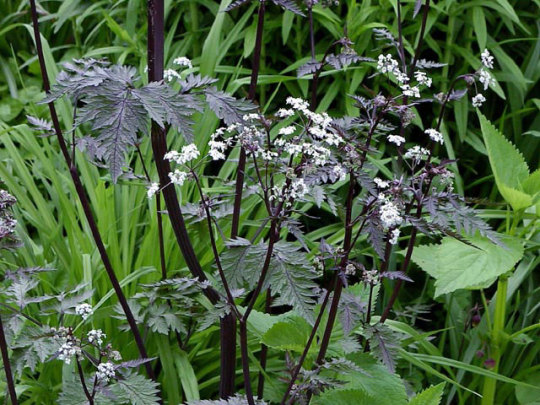
Anthriscus sylvestris 'Raven's Wing'
Category: Seminum | Sub-Category: Perennials for Sun
Scientific Name (Genus/Species): Anthriscus sylvestris 'Raven's Wing'
Family: (Apiaceae)
(B/P) to 5′. Lacey compound umbels of tiny, five-petalled, creamy white flowers, reminiscent of Queen Anne’s Lace, float on hollow, dark stems above fern-like, dusky purple-coloured foliage. Long bloomer that provides an airy elegance to the border. Always admired in our Flower Garden. Self-seeds gently. Sun/partial shade. 3 & 6
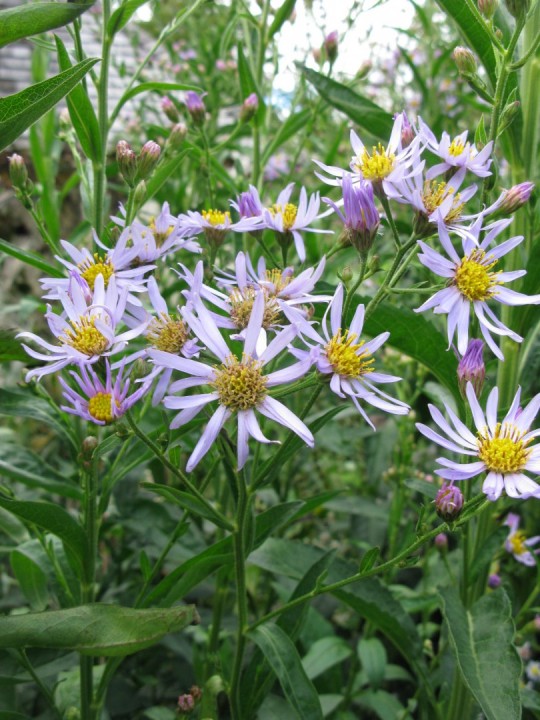
Aster tataricus - this is already thriving in the garden
Category: Seminum | Sub-Category: Perennials for Sun
Scientific Name (Genus/Species): Aster tataricus
Family: (Asteraceae)
(P) to 7′. Tatarian Aster. Siberia. Tall, long-blooming Aster with glorious, loose sprays of bold, lilac-blue daisies with yellow centres. Dense clusters of wide, lance-shaped leaves. Tough, durable plant that will thrive in a variety of conditions. No staking needed, blooms late – September and October and well worth the wait. Sun/partial shade. 3 & 6 & Δ
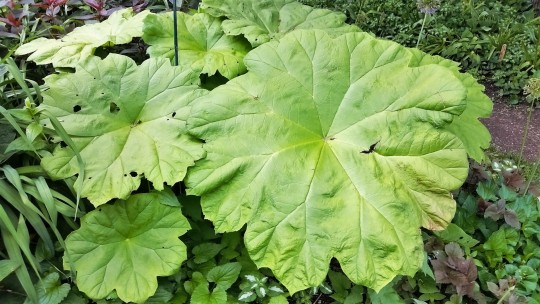
Astilboides tabularis (syn. Rodgersia tabularis) - Planted some last year, started a bunch of seeds - we'll see. 5/3/2024
Category: Seminum | Sub-Category: Woodland
Scientific Name (Genus/Species): Astilboides tabularis (syn. Rodgersia tabularis)
Family: (Saxifragaceae)
(P) to 4′. William Robinson described it best, “A bold growing and handsome species with huge peltate leaves and plumes of creamy white flowers.” Leaves reach a height of 2 to 2.5 feet. A superb plant to use as a focal point in the garden. Definitely stimulates conversation. Partial shade. 4 & T2

Astrantia major
Category: Seminum | Sub-Category: Woodland
Scientific Name (Genus/Species): Astrantia major
Family: (Apiaceae)
(P) to 2.5′. Great Masterwort. Central and eastern Europe. No garden should be without this effortless and beautiful plant. Several greenish white, often blushed pink flowerheads each arranged in a dome with a “collar” of bracts. Dense clumps of divided basal foliage. Content in the flower garden or in the woodland. Summer blooming. Great in flower arrangements, too. Sun/partial shade. PC- 4 weeks. 4 & 7 for 4 weeks, then T2

Campanula takesimana
Category: Seminum | Sub-Category: Woodland
Scientific Name (Genus/Species): Campanula takesimana 'Alba'
Family: (Campanulaceae)
(P) to 2′. Korea. An outstanding white variety of the beautiful Campanula takesimana. Leaves large in basal rosettes. Branched inflorescence of large, pendant bells on nodding stalks. Flowers are pure white with purple spotting within. Blooms July to September. Sun/partial shade. 4 & T2
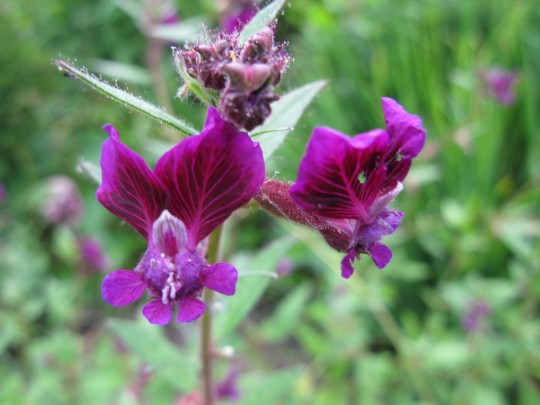
Cuphea viscosissima - Seeds already started 5/3/2024
Category: Seminum | Sub-Category: Annuals for Sun
Scientific Name (Genus/Species): Cuphea viscosissima
Family: (Lythraceae)
(A) to 20″. Blue Waxweed. A North American native and one of our most revered annuals. This non-stop summer bloomer has six deep, magenta-purple petals with the upper two being the longest and a tubular green calyx covered in fine purple hairs. An easy-care annual that requires no deadheading or staking. Very sticky stems trap unsuspecting insects. Self-sows. Sun. 4 & T3
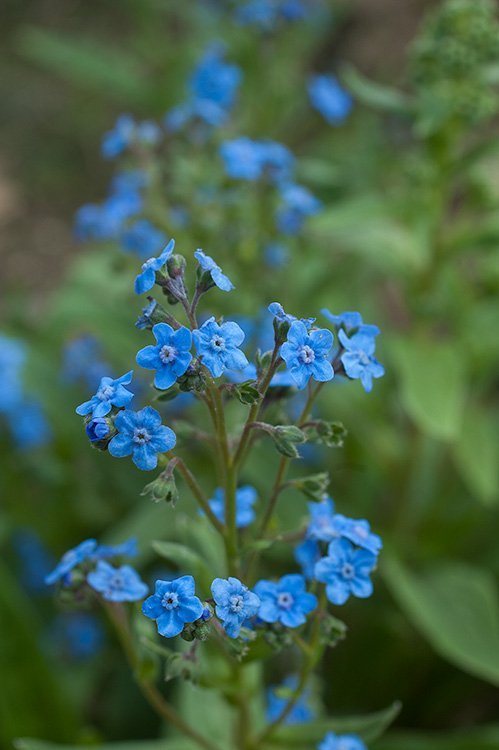
Cynoglossum amabile ‘Firmament’ - chinese forget me not
Category: Seminum | Sub-Category: Annuals for Sun
Scientific Name (Genus/Species): Cynoglossum amabile ‘Firmament’
Family: (Boraginaceae)
(A) to 2.5′. Chinese Forget-me-not. Producing all summer long a profusion of sky-blue, five-petalled flowers. Reminiscent of the Forget-me-not, only taller. Self-sows. Sun. 3, D & T2
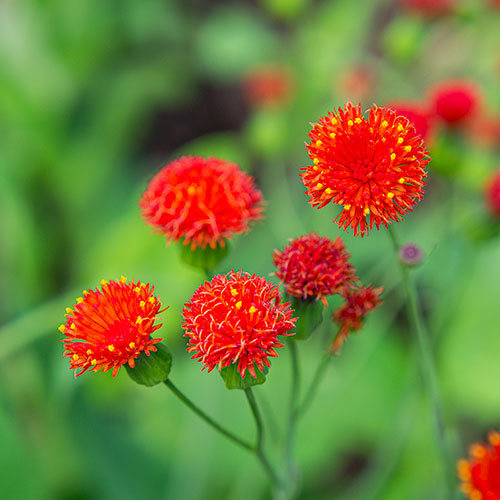
Emilia coccinea
Category: Seminum | Sub-Category: Annuals for Sun
Scientific Name (Genus/Species): Emilia coccinea
Family: (Asteraceae)
(A) to 3′. We love this selection of Tassel Flower. A native of Tropical Africa that produces a profusion of orange to scarlet, thistle-like flowers in terminal corymbs. Best if inter-planted or grown closely together. A real beauty in our Red/Orange/Yellow Bed. Sun.

Helleborus orientalis
Category: Seminum | Sub-Category: Woodland
Scientific Name (Genus/Species): Helleborus orientalis
Family: (Ranunculaceae)
(P) to 2′. Lenten Rose. Europe. Leaves are wide, dentate, glossy and evergreen. Nodding, cup-shaped, pinkish rose, five-petalled flowers have numerous cream stamens. An understated, long-blooming beauty. Early spring. Partial shade. 3 & 72° for 6 weeks, followed by 25-39° for 6-8 weeks.
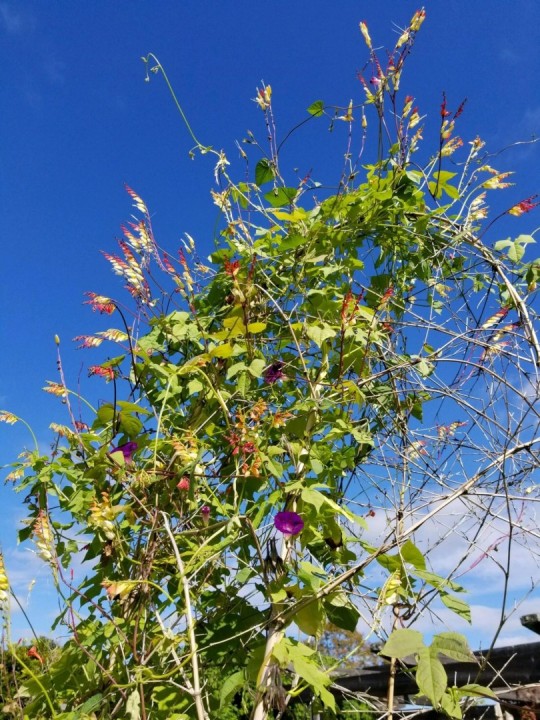
Ipomoea lobata (syn. Mina lobata) spanish flag
Category: Seminum | Sub-Category: Annuals for Sun
Scientific Name (Genus/Species): Ipomoea lobata (syn. Mina lobata)
Family: (Convolvulaceae)
Annual vine to 10′. Spanish Flag or Firecracker Vine. Mexico. An excellent, vigorous, twining vine with attractive, tri-lobed leaves and single-sided, six-inch long racemes of tubular flowers held on slender red stems. The flowers gently arc upward and outward, away from the vine, and mature from red to pale yellow, creating a gradient from the top to the base of the raceme. Blooms freely from mid to late summer until frost. The flowers are highly attractive to hummingbirds, butterflies, and other pollinators. A show-stopper on a tripod. Sun. 1, 2B, 3 & T3

Monarda punctata - Started seeds 5/3/2024
Category: Seminum | Sub-Category: Annuals for Sun
Scientific Name (Genus/Species): Monarda punctata
Family: (Lamiaceae)
(A) to 3′. Horse Mint. Native to the Great Plains of the United States. Dense whorls of pale yellow, hooded flowers spotted with purple-brown. Each whorl is surrounded by large, pink-tipped, green bracts. The narrow, toothed leaves have a grey cast. A very showy plant. Sun. 4 & T1
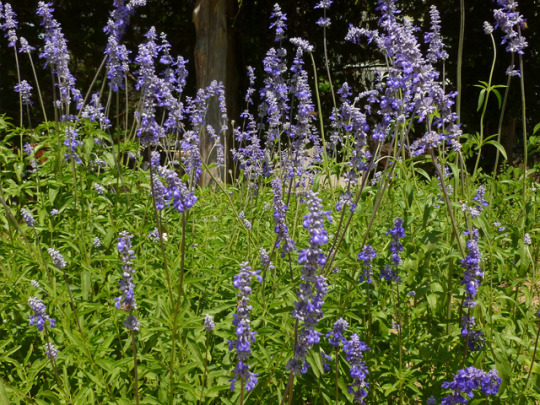
Salvia farinacea
Category: Seminum | Sub-Category: Annuals for Sun
Scientific Name (Genus/Species): Salvia farinacea
Family: (Lamiaceae)
(A) to 3′. Mealy Sage. Native to Texas and Mexico. Tubular, two-lipped, violet-blue flowers are densely congested in whorls along erect stems creating a 4″-8″ spike above the numerous grey-green, lance-shaped leaves. The common name is in reference to the mealy-white (sometimes purple) appearance of the sepals, which are covered with felted hairs. A long-bloomer. Sun/partial shade. 4 & T2
9 notes
·
View notes
Photo

Source: jensgarden
ℍ𝐚𝓵l נ𝐀 𝔳คĻǤẸ - white anemone. Võsaülane. Anemone sylvestris
13 notes
·
View notes
Text

@mi-spark They are! I knew I wanted some flowers in this and these were the ones that made most sense to me. I sadly don't know what kind of flowers they are, but I looked at anemone sylvestris pictures for reference. (Could be something else entirely, though, I'm really not a botanist.)
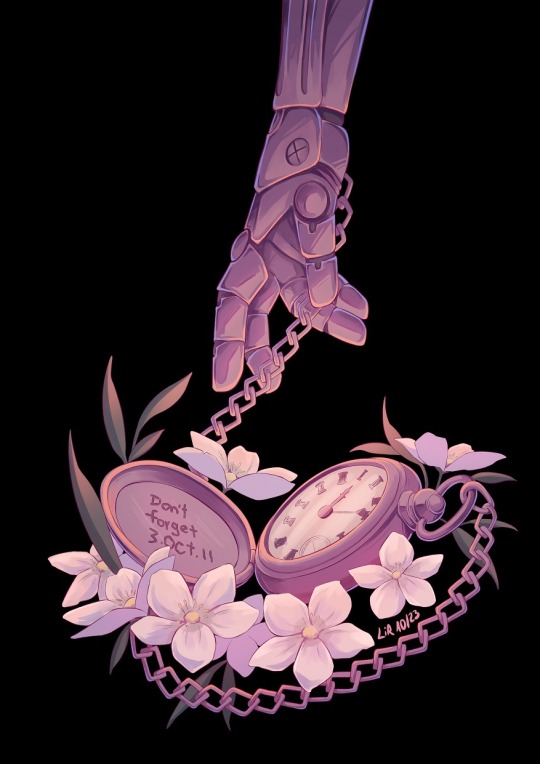
Don't forget.
16K notes
·
View notes
Text
Anemone Sylvestris — FOTD Sep 06
Hi all My latest post for Cee’s FOTD. Anemone sylvestrisAnemone Sylvestris — FOTD Sep 06

View On WordPress
0 notes
Text

Snowdrop Anemone, Snowdrop Windflower
Anemonoides sylvestris
18 notes
·
View notes
Text
Metsülane (Anemonoides sylvestris)

Saksa keeles Großes Windröschen või Windanemone, Inglise keeles snowdrop anemone või snowdrop windflower.
Pilt: daryl_mitchell from Saskatoon (Saskatchewan, Canada), CC BY-SA 2.0, Wikimedia Commons
0 notes
Text
Anemone sylvestris
Anemone sylvestris, aka Snowdrop Anemone ....#God #ThankYouGod #gardening #garden #gardens #gardendesign #gardeninspiration #gardenersofinstagram #instagarden #design #bloom #nature #natural #beauty #flower #floral #backyardgarden #gardenlove #gardenlife #landscaping #mygarden #flowers #perennials #landscape #blessed #startup

View On WordPress
1 note
·
View note
Text
The Different Types of Anemone Seeds and How to Choose the Right Ones
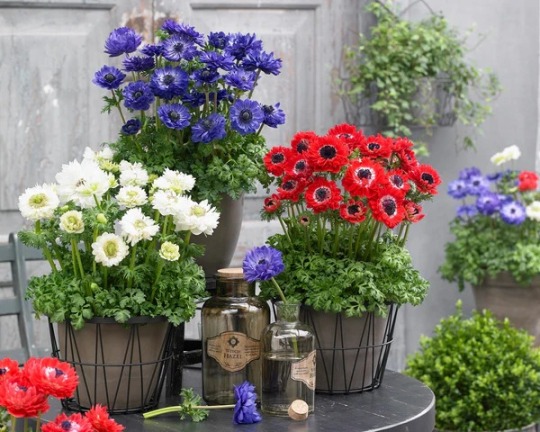
Anemones are exquisite flowers that add a touch of elegance and vibrancy to any garden. With a wide variety of anemone seeds available, choosing the right ones can be both exciting and overwhelming. In this guide, we'll delve into the different types of anemone seeds and provide tips on selecting the best flower seeds for your garden.
Understanding Anemone Seeds: A Brief Overview
Anemone seeds come in various species and cultivars, each offering unique colors, shapes, and growth habits. Some of the popular types of anemone seeds include:
Anemone Coronaria: Known for their bold and colorful flowers, Anemone Coronaria seeds produce blooms in shades of red, pink, purple, and white. These flowers feature a prominent dark center and are commonly used in bouquets and floral arrangements.
Anemone Nemorosa: Also known as wood anemones, these seeds produce delicate white or light pink flowers with yellow centers. Anemone Nemorosa is a woodland species that thrives in shaded areas, making it ideal for naturalizing under trees or in woodland gardens.
Anemone Blanda: With its daisy-like flowers in shades of blue, pink, and white, Anemone Blanda seeds are perfect for adding early spring color to rock gardens, borders, and containers. These low-growing plants create a carpet of cheerful blooms.
Anemone Sylvestris: This tall variety of anemone seeds produces elegant white flowers with golden stamens. Anemone Sylvestris is a perennial species that blooms in late spring to early summer, attracting pollinators and adding a graceful touch to garden borders.
Choosing the Right Anemone Seeds for Your Garden
When selecting anemone seeds for your garden, consider the following factors to ensure success and enjoyment:
Climate and Growing Conditions: Different species of anemones thrive in specific climate zones and growing conditions. Choose seeds that are suitable for your region's climate, soil type, and sun exposure to ensure healthy growth and abundant blooms.
Growth Habit and Size: Anemones vary in growth habits, from low-growing ground covers to tall, upright varieties. Determine the space available in your garden and select seeds that match your desired plant height and spread.
Color Preferences: Consider your color preferences and overall garden design when choosing anemone seeds. Whether you prefer vibrant hues or soft pastels, there's an anemone variety to suit your aesthetic vision.
Blooming Season: Anemones bloom at different times of the year, ranging from early spring to late summer. Choose seeds that align with your desired blooming season to create a continuous display of flowers throughout the year.
Companion Planting: Explore companion planting options to enhance the beauty and functionality of your garden. Pairing anemones with compatible plants such as spring bulbs, perennials, or annuals can create stunning color combinations and attract beneficial insects.
Tips for Successful Anemone Seed Planting
Once you've selected the right anemone seeds for your garden, follow these tips for successful planting and cultivation:
Prepare the Soil: Ensure the soil is well-draining, fertile, and free from weeds before planting anemone seeds. Incorporate organic matter such as compost to improve soil structure and fertility.
Sow Seeds at the Right Depth: Follow the instructions on the seed packet for the recommended sowing depth. Anemone seeds are typically sown shallowly, about 1/4 to 1/2 inch deep, and spaced according to the specific variety's requirements.
Provide Adequate Water and Sunlight: Water newly planted seeds gently to keep the soil evenly moist but not waterlogged. Anemones prefer partial to full sunlight, so choose a planting location that receives adequate sunlight for optimal growth and blooming.
Monitor Growth and Health: Keep an eye on your anemone plants as they grow, checking for signs of pests, diseases, or nutrient deficiencies. Provide additional water during dry periods and fertilize as needed to support healthy growth and abundant blooms.
Mulch and Protect: Mulch around anemone plants to conserve moisture, suppress weeds, and maintain a consistent soil temperature. Protect young seedlings from extreme temperatures, strong winds, and pests to ensure their survival and vigor.
By understanding the different types of anemone seeds available and following these tips for choosing and planting the best flower seeds for your garden, you can create a stunning display of colorful blooms that enhance your outdoor space year after year. Explore the beauty and versatility of anemones in your garden and enjoy the rewards of a thriving floral paradise.
0 notes
Photo

Framed
60 notes
·
View notes
Video
Wood Anemone by Peter Stenzel Via Flickr: Großes Windröschen - Anemone sylvestris Sony A7RIII with FE 90mm 2.8 Macro
#Blumen#Natur#Pflanzen#wood anemone#anemone sylvestris#anemone#Windröschen#darktable#flower#bokeh#spring#Frühling#ILCE-7RM3#SEL90M28G#flickr
0 notes
Photo

White cover of anemones by MiroslavStamenov
2 notes
·
View notes
Photo

ℍ𝐚𝓵l נ𝐀 𝔳คĻǤẸ - Metsülane. Anemone sylvestris
2 notes
·
View notes
Photo

Thank you for understanding.
#flower photography#flower garden#anemone#anemone sylvestris snow white#end of the connection#thank you for understanding#self-sacrifice#hopelessly in love
11 notes
·
View notes